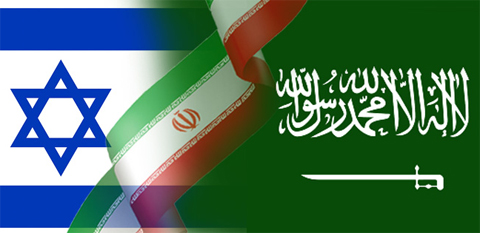JERUSALEM: Israel's military chief of staff said in an interview yesterday that his country was prepared to cooperate with Saudi Arabia to face Iran's plans "to control the Middle East." His comments were the latest sign that behind-the-scenes links between Israel and Gulf countries may be occurring due to Iran, their shared enemy, even though they do not have formal diplomatic ties. "We are ready to exchange experience with the moderate Arab countries and exchange intelligence information to face Iran," Lieutenant General Gadi Eisenkot was quoted as saying by Elaph, a news website run by a Saudi businessman. Asked whether any information had been shared recently with Saudi Arabia, he said "we are ready to share information if necessary. There are many common interests between us and them."
Israel's army confirmed the contents of the rare interview with Arabic-language media. According to Israel's army, it was the first interview of its kind since 2005. Sunni Muslim powerhouse Saudi Arabia has long been at loggerheads with Shiite, non-Arab Iran but friction has spiraled recently. Earlier this month, Lebanese prime minister Saad Hariri announced from Saudi capital Riyadh that he was quitting, citing Iran's "grip" on his country. The leader of Hezbollah, the Lebanese Shiite group supported by Iran, has accused Saudi Arabia of pressing Israel to launch attacks against it. Iranian President Hassan Rouhani made similar allegations this week.
Israel and Hezbollah fought a devastating war in 2006. Eisenkot said in the interview that "we have no intention of initiating a conflict with Hezbollah in Lebanon and reaching a war, but we cannot accept strategic threats to Israel there. "I am very happy with the calm on both sides of the border, which has lasted 11 years. On the other hand, we see Iranian attempts to escalate." Israel and Arab countries are also concerned with Iran's influence in Syria, where Tehran and Hezbollah are backing President Bashar al-Assad's regime in his country's civil war. Gulf Arab countries are also worried about the Islamic republic's support for Shiite Houthi rebels in Yemen.
'New international alliance'
Eisenkot referred to US President Donald Trump's attempt to find a path to Israeli-Palestinian peace by drawing in regional countries. Trump's first trip abroad as president included stops in Saudi Arabia and Israel. His son-in-law and adviser Jared Kushner has reportedly formed a bond with Saudi Crown Prince Mohammed bin Salman. "With President Donald Trump, there is a chance for a new international alliance in the region and a major strategic plan to stop the Iranian threat," Eisenkot said. Israeli Prime Minister Benjamin Netanyahu has been promoting the idea that his country's ties with Arab nations are improving, and some experts have said there are signs that shared concerns over Iran are indeed nudging them closer.
Formal ties do not seem likely due to Israel's continuing occupation of Palestinian territory and the lack of progress in peace efforts, but behind-the-scenes cooperation has opened up in various areas, a number of experts and officials have said. Netanyahu has described relations with the Arab world as the "best ever", though without providing any details. Leaders of Arab countries have not publicly made similar comments, however that does not necessarily mean they dispute Netanyahu's claim. They face sensitivities within their own countries, where the Jewish state is often viewed with intense hostility. Only two Arab countries-Egypt and Jordan-have peace treaties with Israel._ AFP










